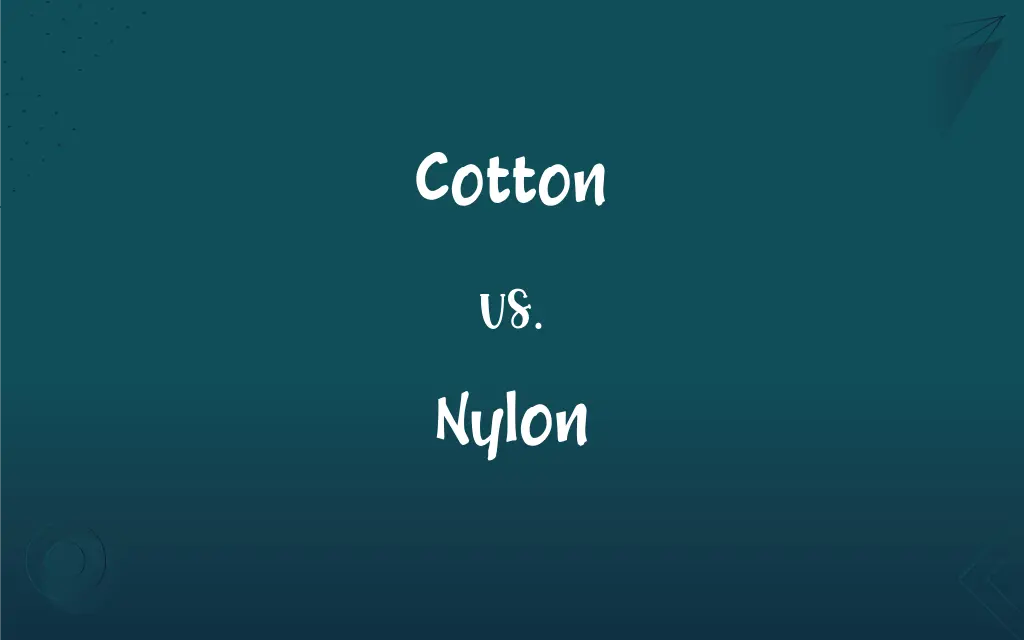Cotton vs. Nylon: What's the Difference?
Edited by Harlon Moss || By Janet White || Published on December 31, 2023
Cotton is a natural fiber obtained from the cotton plant, known for its breathability and softness. Nylon is a synthetic polymer, known for its strength, elasticity, and resistance to mildew and abrasion.

Key Differences
Cotton is a natural fiber harvested from the cotton plant, widely used in textiles due to its softness, breathability, and hypoallergenic properties. Nylon, a synthetic fiber created from polymers, is known for its exceptional strength, durability, and elasticity, often used in various applications from clothing to industrial products.
Cotton fibers are absorbent, making them ideal for towels and summer clothing, as they wick moisture away from the body. Nylon, however, is less absorbent than cotton and is known for its quick-drying properties, making it a popular choice for swimwear and activewear.
In terms of environmental impact, cotton, while natural, requires significant water and pesticides for cultivation. Nylon, being synthetic, is derived from petrochemicals, but it has a more extended lifespan and can be recycled, reducing its environmental footprint.
Cotton garments are comfortable and gentle on the skin, making them suitable for everyday wear and for those with sensitive skin. Nylon's high tensile strength and resistance to damage from oils and chemicals make it ideal for more demanding applications like outdoor gear and hosiery.
Cotton tends to wrinkle and shrink when washed and dried, requiring more care in laundering. Nylon is wrinkle-resistant and maintains its shape better over time, offering ease of maintenance.
ADVERTISEMENT
Comparison Chart
Origin
Natural fiber from cotton plant
Synthetic polymer
Moisture Absorption
Highly absorbent
Less absorbent, quick-drying
Environmental Impact
Requires water and pesticides
Derived from petrochemicals, recyclable
Properties
Soft, breathable, hypoallergenic
Strong, elastic, mildew-resistant
Care and Maintenance
Prone to wrinkles and shrinkage
Wrinkle-resistant, easy to maintain
ADVERTISEMENT
Cotton and Nylon Definitions
Cotton
Cotton fabric is known for its breathability and natural comfort.
She preferred cotton sheets for their coolness in summer.
Nylon
Nylon is often used in activewear for its quick-drying and stretchable qualities.
The nylon leggings were perfect for her yoga sessions.
Cotton
Cotton is a soft, fluffy fiber that grows in a boll around the seeds of cotton plants.
The cotton t-shirt was incredibly soft and comfortable.
Nylon
Nylon is used in a wide range of products, from clothing to automotive parts.
Her nylon jacket was lightweight yet resistant to wind and rain.
Cotton
Cotton is widely used in textiles, from clothing to home furnishings.
The cotton curtains added a cozy feel to the room.
Nylon
Nylon is a synthetic thermoplastic polymer, known for its strength and flexibility.
The nylon backpack was durable enough for hiking.
Cotton
Cotton absorbs moisture well, making it ideal for towels and athletic wear.
He always used cotton towels for their superior absorbency.
Nylon
Nylon fabrics are known for their resistance to wrinkles and shrinkage.
The nylon curtains remained smooth without ironing.
Cotton
Cotton is hypoallergenic and gentle on the skin.
Baby clothes are often made of cotton due to its gentleness.
Nylon
Nylon can be recycled, reducing its environmental impact.
Recycled nylon is increasingly used in eco-friendly clothing lines.
Cotton
Any of various shrubby plants of the genus Gossypium, having showy flowers and grown for the soft white downy fibers surrounding oil-rich seeds.
Nylon
Any of a family of high-strength, resilient synthetic polymers, the molecules of which contain the recurring amide group CONH.
Cotton
The fiber of any of these plants, used in making textiles and other products.
Nylon
Cloth or yarn made from one of these synthetic materials.
FAQs
Is cotton sustainable?
Cotton's sustainability varies; it requires a lot of water to grow, but organic cotton has a lower environmental impact.
Can cotton be recycled?
Yes, cotton can be recycled, though the process can reduce its quality.
What is cotton?
Cotton is a natural fiber that comes from the cotton plant, used primarily in textile manufacturing.
What are the characteristics of cotton fabric?
Cotton fabric is breathable, absorbent, soft, and comfortable but can wrinkle easily.
How is cotton harvested?
Cotton is harvested either by machines or by hand, depending on the region and farm size.
Where is cotton grown?
Cotton is grown in numerous countries, with major producers including India, China, the United States, and Pakistan.
What is the difference between organic and regular cotton?
Organic cotton is grown without synthetic chemicals and genetically modified seeds, unlike regular cotton.
Is cotton hypoallergenic?
Yes, cotton is generally hypoallergenic and doesn't irritate the skin.
How should cotton garments be cared for?
Cotton garments should be washed in cool or warm water to prevent shrinking and can be ironed.
What is nylon?
Nylon is a synthetic polymer, first produced in the 1930s, commonly used in textiles and plastics.
How is nylon made?
Nylon is made through a chemical process called polymerization, using petrochemicals.
What are nylon's key properties?
Nylon is strong, elastic, lightweight, and resistant to mildew and abrasion.
What are the uses of cotton?
Cotton is used for clothing, bedding, towels, and numerous other textile products.
Is nylon environmentally friendly?
Nylon production is energy-intensive and relies on non-renewable resources, making it less environmentally friendly.
How is nylon used in clothing?
Nylon is often used in activewear, swimwear, hosiery, and as a blend with other fabrics to add stretch.
How does nylon compare to cotton?
Nylon is more durable and elastic but less breathable than cotton.
Is nylon waterproof?
Nylon is not inherently waterproof but can be treated to become water-resistant.
Can nylon fabric cause allergies?
Nylon is generally hypoallergenic, but some people may react to chemicals used in its production.
Can nylon be recycled?
Yes, nylon can be recycled, but the process is complex and less common than recycling other materials.
How should nylon garments be cared for?
Nylon garments should be washed in cold water and air-dried to prevent damage and maintain elasticity.
About Author
Written by
Janet WhiteJanet White has been an esteemed writer and blogger for Difference Wiki. Holding a Master's degree in Science and Medical Journalism from the prestigious Boston University, she has consistently demonstrated her expertise and passion for her field. When she's not immersed in her work, Janet relishes her time exercising, delving into a good book, and cherishing moments with friends and family.
Edited by
Harlon MossHarlon is a seasoned quality moderator and accomplished content writer for Difference Wiki. An alumnus of the prestigious University of California, he earned his degree in Computer Science. Leveraging his academic background, Harlon brings a meticulous and informed perspective to his work, ensuring content accuracy and excellence.







































































